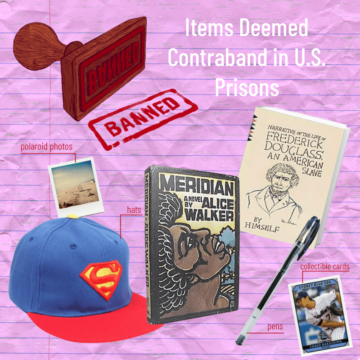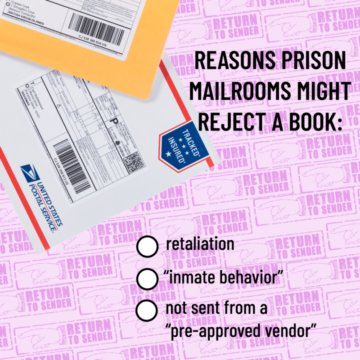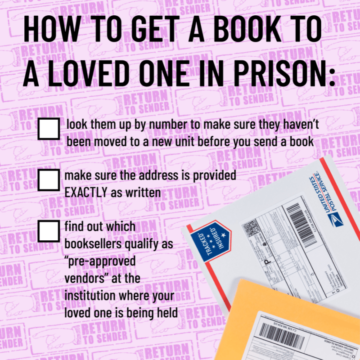This story originally appeared in Scalawag Magazine,
On December 14, 2020, we were nine months deep in the pandemic. The bookstore was open by appointment only. The holiday season, normally our busiest time, was looking bleak. We hadn’t had a single appointment all day. The weather outside was cold and gray.
I saw her peeking in the window. She asked if she could look around. I unlocked the door and noticed how much better the store felt with a customer present. I gave her the spiel: We only sold books from small and independent presses—No Tom Clancy. No Danielle Steel.
She said she wanted a gift for her brother.
“He’s so bored he’s losing his mind,” she told me, as I recommended two books I’d recently read. Then she asked whether or not we shipped books to prisons.
For him, lockdown meant no access to the library, the cafeteria, or recreational exercise—all the things we’d been resorting to to keep ourselves sane. This package of books wouldn’t just be a thoughtful gift, it was a signal that family and friends were still alive.
I explained that we didn’t ship books at all. As a one-room store without an online inventory, we just weren’t set up for that. She told me that the books couldn’t come from her directly; they had to be mailed from a bookstore.
My conscience tugged at me a bit; we were indeed a bookstore, and we’d made exceptions to the rules before. In the end, I agreed to mail the books for her, but had I known then what I know now about shipping books to prisons, I would have suggested that she order them online instead, from a retailer with a greater chance of successfully getting books inside. And even then—if she did everything right, if the books were deemed appropriate reading material and not banned—they still might be returned from Yazoo City, Mississippi, where her brother is incarcerated, without a reason. I would have made sure she knew that she might still lose time, money, and the opportunity to connect to her loved one through a gesture of kindness that says I’m here, thinking about you.
“Even if our customers follow all of the facility’s criteria, sometimes things still get rejected and sent back to us.”
But I didn’t know that yet. I naively pictured an outcome that would never come to pass—her brother receiving the two books she picked out, containing her notes, her handwriting, just before Christmas. I envisioned him sinking into the pages of two memoirs written during two world wars—another time when it felt as though the world was ending—and possibly finding escape, knowledge, perhaps even comfort knowing that the globe has been on the brink before.
What I didn’t know was that prisons treat books as restricted commodities, a privilege—not a right—less essential than the right to bear arms, but in the eyes of the state, somehow just as dangerous.
Dani, a volunteer at Inside Books Project, wants you to know that Texas prison libraries aren’t like what you see on Orange is the New Black, with rows and rows of shelves that a booktruck can be pushed through. On the contrary, even before the pandemic, people in solitary confinement couldn’t request a trip to the library. During the pandemic, it got even worse.

Inside Books has been shipping free books to Texas prisoners since 1998. In order to receive them, an incarcerated reader writes a request letter asking for books of a certain genre, or in their interests. Inside Books receives over 2,000 requests a month, and they do the best they can to match each person’s request with titles in their donation library. Dani understands firsthand how confusing it can be for families and friends to know exactly what they need to do to get books to their loved ones—she’s the one who answers their emails.
Inside Books Project sends to nearly all the Texas prisons, including a personalized letter in each mailing. The Texas Department of Criminal Justice refers to incarcerated people as “offenders.” Dani noted that for some, these books are the only mail they get addressed to them by name.
After letters from family and friends and photos of loved ones, books are next in line, said Cynthia Simons, coordinator of the Texas Women’s Justice Coalition at the Texas Center for Justice and Equity. She works closely with system-impacted women, and understands just how important books are to those experiencing incarceration. She said that these packages are a critical way people on the inside establish connection to the free world.
Additionally, she added that while individuals might easily arrive in prison with “limited literacy,” they often “put in energy and effort to self-educate” and come out the other side with knowledge they didn’t have before, against great odds.
Simons told me that this isn’t the sort of outcome that the prison system wants; “Anything to educate or empower [is] screened by the mailroom,” and most often banned, Simons said.
And there’s proof to back her up.
Inside Books started an archive that keeps track of titles that were denied by the Texas Department of Criminal Justice. In 2012, an incarcerated person requested a copy of Narrative of the Life of Frederick Douglass: An American Slave. That request was denied by the department, because according to the mailroom worker the book contained “racial remarks” on pages 35, 41, and 87. In this case, the prisoner appealed the decision, which meant the book would be passed to the Director’s Review Committee. Because a PO Box address was listed, that meant the book would have to be mailed within two weeks of the date of the “offender notification.”
Unfortunately, I don’t know whether the appeal was successful or not. I do know that other books denied included RL’s Dream by Walter Mosely, and Meridian by Alice Walker. A 2016 summer newsletter printed by Inside Books Project was also denied.
In fact, more than 10,000 books have been banned.
A 2017 article in The Dallas Morning News revealed that Adolf Hilter’s Mein Kampf, James Battersby’s The Hole Book of Adolf Hitler, and two titles by David Duke are allowable but The Color Purple is not. In June 2019, Prison Legal News posted on Twitter that White Power by George Rockwell—the founder of the American Nazi Party—was approved, but Hate Crime: The Story of a Dragging in Jasper, Texas by Joyce King was denied.

For booksellers working in-person with customers, it can be difficult to suggest titles without knowing which recently-released titles have been banned. MK Brown of BookPeople, another independent bookstore located in Austin, stated that their store has regulars who come in every few months to get assistance picking out books for their loved ones.
In the last year and a half, books about anti-racism, race, white privilege, the criminal justice system, and abolition have been released and widely-read. But without a current list of banned books made available to the public, booksellers, family members, and friends practically have to guess what’s been approved inside.
Would Oprah’s 2020 Book Club Pick Isabel Wilkerson’s book Caste: The Origins of Our Discontent be allowed? (The Department of Justice says that books from book clubs are OK—but does Oprah have to ship them, affixing to the package her book club seal?) In several states, The New Jim Crow: Mass Incarceration in the Age of Colorblindness by Michelle Alexander—a New York Times Best-Seller for 250 weeks—has also been denied.
What could possibly be the rationale? Simons has a simple answer: “Prison is there to break you, it’s there to break you down so that you become submissive to them.”
Anything can be used as leverage, including access to knowledge. According to the Texas Department of Criminal Justice books can be denied for the following reasons:
- A) It contains contraband that cannot be removed
- B) It contains information regarding the manufacture of explosives, weapons, or drugs
- C) It contains materials that a reasonable person would construe as written solely for the purpose of communicating information designed to achieve the breakdown of prisons through offender disruption such as strikes, riots, or security threat group activity
- D) A specific determination has been made that the publication is detrimental to offenders’ rehabilitation, because it would encourage deviant criminal sexual behavior
- E) It contains material on the setting up and operation of criminal schemes or how to avoid detection of criminal schemes by lawful authorities charged with the responsibility for detecting such illegal activity
- F) It contains sexually explicit images.
Rule C is especially problematic, because it means mailroom staff are equipped with the power to block books that talk about race, racism, and social justice movements. A book about how to make explosives is one thing, a book banned because it was written by a Black author is another. C also conflates strikes with riots and security threats—which are not the same thing.
Perhaps the words of Alice Walker, Michelle Alexander, and Joyce King threaten to expose the unsettling connections between slavery and the systemic overpolicing of Black people in this country.
It’s striking to remember that in Narrative of the Life of Frederick Douglass, the book deemed inappropriate by the John B. Connally Unit, Douglass’ owner scolds his wife for teaching Douglass to read, because he thought literacy would inspire the desire for freedom.
The first signal that getting the books to Yazoo City, Mississippi, might be a problem occurred when our store’s owner went to the post office. After waiting in line for over an hour, we were told that the address didn’t come up. My manager was able to find the prison website and look up our customer’s brother by his inmate number. It looked like the 9 she had told us was actually supposed to be a 5, so my manager emailed the customer to confirm. I looked at the Google map of the cluster of prisons in Yazoo City and wondered which facility he was in.
The prison’s website said that “inmates may receive magazines, hard, and paperback books from the publisher.” This also struck me as confusing. People don’t generally order books directly from a publisher like HarperCollins, they go to bookstores or order online. Book stores don’t even place orders from publishers, we order them through distributors (which are also sometimes publishers, such as Random House and Norton).
I wondered if the customer’s inscription counted. I also wondered if the rules vary from state to state, if Mississippi was different from Texas.
The website offered a link to a PDF with more information written in legalese: Finally, page 2 noted that at “all Bureau institutions, an inmate may receive hardcover publications and newspapers only from the publisher, from a book club, or from a bookstore.”
My manager enlisted the staff member with the best handwriting to write the address on an envelope with our logo and return address, which was then taped to the front of a bubble mailer. I was worried this might not be enough proof that we were indeed a bookstore. This time, the post office was able to send the package. It wouldn’t arrive by Christmas, but it was on its way.
I had never had to do this much research just to get a book to its recipient. I reached out to other independent bookstores to see if they had experienced any of these issues shipping books to prisons. Brown noted that correct labeling can be a big issue for BookPeople, too.
“Addresses can be confusing, and often the sender doesn’t totally understand how prison addresses work. I’ve had to do research into making sure that it’s formatted in a way where the package will actually reach the inmate.”
The customer service representative at Half Price Books named the same issue, that “even if our customers follow all of the facilities criteria, sometimes things still get rejected and sent back to us.” Another local bookstore owner who did not want to go on the record said that she’s had books bounce back for a whole slew of reasons, like the title not being accepted, incorrect addressing, or because her store wasn’t a publisher.
You’d think that Amazon would have an easier time than small indie bookstores shipping books to prisons because of its monolithic brand recognition—after all, the company also became a publisher in 2009. But as it turns out, this isn’t always the case.

For example, if a friend or family member opts for the cheaper option of buying a new book from an Amazon seller rather than through Amazon directly, they could easily encounter similar roadblocks. Amazon sellers frequently experience returns. The forums are shut down after 180 days, but a few posts include the fear that if a seller was to refuse to ship an order to a prison it could have an impact on their seller rating. Not only are the shipping costs nonrefundable, but some sellers charge a “restocking fee.” Amazon recommends that customers “contact the prison first to confirm that they accept deliveries and to ask about any special policies they have.”
I emailed Deb Olin Unferth, the director of Pen City Writers, a creative writing program at the John B. Connally Unit in south Texas that I had volunteered at as a mentor years prior, to see if she had any insights into shipping books to prisons. She told me that it varied a lot between prisons, and that some prisons required that the bookstore be a “pre-approved vendor.”
She added a new fear to my list: “no handwritten notes or cards inside.”
I wondered if the customer’s inscription counted. I also wondered if the rules vary from state to state, if Mississippi was different from Texas.
“If it doesn’t work” Unferth said, “just issue her a refund.”
Sure enough, in January the books we’d sent to Yazoo City landed back on the bookstore counter. The package was stamped “return to sender,” and “unable to forward.” The package was still sealed, never even opened.
For months, it sat in the back of our store. My manager reached out to the customer one last time to offer a refund, but we never heard back. She refunded the card anyway, but it didn’t go through.
Money and time wasted. Human connection thinned even further.
I know now that I still have so much more to learn about the quagmire that is getting books into prisons. Booksellers find themselves in the position of doing detective work to figure out what went wrong, while the burden of navigating the system falls to friends, relatives, and people currently incarcerated. Prisons themselves aren’t called on to make their processes transparent, or even easy to understand, nor are they expected to implement a proper unbiased review system of reading material, or to release an updated list of banned books for the public.
Other abuses against incarcerated people—like the absence of air conditioning and heat, or access to food, basic healthcare, and protection from assault—are all more pressing issues that urgently need to be addressed. But as a bookseller, I agree with Dani, who considers herself an abolitionist: “I think reading materials is a human right.”
Books offer nourishment in another form, and that nourishment is lifesaving.







